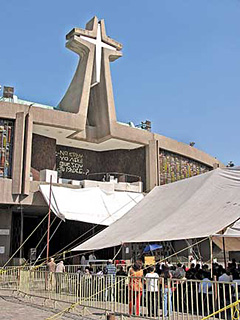
|  |  |  Editorials | Issues | May 2009 Editorials | Issues | May 2009  
Relying on Religion in Uncertain Times
 Malcolm Beith - The News Malcolm Beith - The News
go to original


| | Religion and faith tend to play a large role during crises. (The News/Malcolm Beith) |  |
For more than 50 years, Guillermo Martínez has gone to the Basílica de Guadalupe in Mexico City on the first of every month. He attends Mass and then pays a visit to the Virgen de Guadalupe.

This Friday was not all that different - except the 300th anniversary of the old Basílica's construction was supposed to be celebrated that day, his city is in the midst of a flu outbreak and Masses are now being held outside the Basílica on account of flu concerns.

But the 75-year-old Martínez, who was wearing a flu mask, was simply happy to be able to almost go through his normal routine.

"I feel more free here than outside," he said, pointing over the fence that separates the Basílica grounds from the normally teeming metropolis.

"Out there, one feels the tension. There's always a lot of tension."

Religion and faith tend to play a large role during crises, and in Mexico - which is 90 percent Catholic - it's likely to play a major part in the coming weeks as concerns about the flu outbreak continue. Last Sunday, for the first time since a cholera outbreak in the 1800s killed thousands in Mexico, a colonial-era statue of Jesus Christ that is supposed to have warded off disease in the past was carried out of the Metropolitan Cathedral and paraded through the streets. Hugo Valdemar, a spokesman for the Mexico City archbishop, said it was taken out of its resting place because the situation was deemed "very serious and worthy of this tradition."

But the Catholic Church has so far had to take a back seat to science and necessity during this particular crisis, rendering it nearly invisible even as people may be in more need of faith than ever.

The Mexico City hierarchy has had to take government-mandated precautions: Masses are being held outside or not at all, by order of Mexico City Archbishop Norberto Rivera; they are also being transmitted by radio and television; and not being able to participate in traditional religious rituals has already rankled some residents, particularly those who wanted to see the image of the Virgen this week but were told it was closed to the public.

It's now open. And on Friday, visiting the Virgen was all that was on 19-year-old Nayelli Telles' mind.

"This is more important than anything," she said as she walked into the Basílica grounds. "I come here every Friday, and I'm here like always."

Plus, she said, "I don't believe in the illness. I don't believe it."

Telles isn't the only nonbeliever out there right now. Conspiracy theories abound throughout Mexico, as do doomsday scenarios.

The church hasn't played into them to pander to the masses, however. And Religious Studies expert Víctor Ramos Cortés of the University of Guadalajara praised Catholic Church leaders - who are often criticized for making comments that appear woefully out of touch - for not falling into the trap of questioning the authorities.

The church has been "sensible and responsible" in its treatment of the outbreak, said Ramos Cortés. Indeed, at the Basílica's entrance lie pamphlets explaining precautions to be taken to avoid the flu; city government posters with the same instructions are posted on walls throughout the Basílica grounds. Priests and anyone who works with them are wearing masks too. On the Basílica grounds, a Red Cross ambulance sits waiting, ready to administer a flu test to anyone who comes up to its doors.

Ramos Cortés also said the church was doing a good job with respect to heeding the advice of the city government, with which it has been at loggerheads in the past over issues like abortion. "They could be talking about the seven plagues of Egypt," he said. "But so far, it's been [treated] as a medical thing. There hasn't been any fanatical interpretation."

"Very few people think they're being punished by God - and it's not unlikely people might think that," he said.

For devotees like Martínez and Telles, the most important thing right now, however, is that the church's doors are open - even if only metaphorically. "I must come here," said Martínez. "It's my duty." |

 |
|  |



